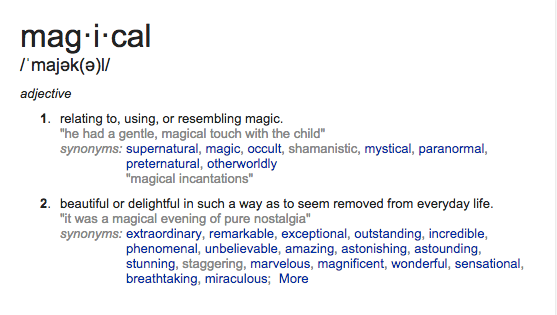
I write a lot each day. About 12 hours (or more) of my day are spent hunched over a keyboard, clickity-clacking away at some email, blog post, or note. And though I have already written so much throughout my life, I always fee like two things are true:
- I need to write more — a lot more. In fact, we all need to write more.
- Writing still feels utterly magical. Which is why #1 still holds true.
What do I mean when I say writing is magical? I really do mean magical.

The second definition — specifically the portion about being removed from everyday life — is what I mean when I say that writing is magical. When done correctly (by which I don’t mean done well), writing can transform your thoughts and feelings into something more — something powerful. That’s the magic.
Writing Reveals Meaning
We are all living a story, but we’re not all aware of the ins and outs of those stories — both our own and those of others. Writing helps you understand what is happening in your own world, what is happening in the worlds of those close to you, and what all of it means. It doesn’t happen right away — no deep understanding does.
You will have to spill a lot of ink, but if you keep doing it, you will begin to see a clearer image of things come to the fore. Your own narrative materializes. It’s a curious combination of discovery and creation. You see what was already there, but hidden. You also inject something new into the mix. You cut through the thicket to forge a path heretofore untrodden.
Writing Clarifies
My wife watches a lot of true crime shows, which means that I do as well. What I’ve learned from watching these is that interrogation is a useful tool. Good detectives will sit down with a suspect and begin chiseling away at the hard surface they’ve projected. They ask the same questions over and over — and they do so on purpose. They want the truth; they want to understand. But as any good detective will tell you, the best results come when whoever you’re interrogating feels like they can open up to you.
When you write about what you’re thinking and feeling — just like when interrogating a suspect — you will get a lot of false starts. Like someone being interrogated, you will frantically stutter through false narratives about yourself. You’ll prattle on about what you think you should feel, what you think you should want — whatever sounds good. But if you keep interrogating yourself, eventually you will open up. You will have sifted through all the emotional and intellectual noise, pinpointing the clear signal. That is magical, because understanding yourself better — especially after being confused and laying it all out — can be transformative.
Writing Strengthens
Ideas pop into your mind much like infants pop into the world: naked, weak, and unformed. And like infants, ideas need to be nurtured, they need care and attention in order to turn into what we hope they become. Writing provides all of that. It is the swaddling clothing, the feeding hand, the nurturing guide to your ideas. Writing puts your ideas into battle with reality, where only the strongest ones survive — and they are stronger as a result.
I have yet to find a time where I was stuck on how to solve a problem, or what to think about a topic, and writing about it didn’t help. The obvious reason is that writing walks hand in hand with thinking. It lays out your ideas in front of you, in real time, where you are forced to deal with them — to accept, reject, or refine them. Those ideas worth a damn stay, the rest fall away. Wash. Rinse. Repeat. What you’re left with is a stronger set of ideas, a stronger sense of self. You’re still you, but now you know better who you are.
As often as you can, as sincerely as you can: write, think, and write more. Don’t stop until the ideas do…which is hopefully never (or when you die).
Did you enjoy reading this piece? Consider subscribing to my weekly newsletter — Woolgathering. I think you’ll enjoy that, too.